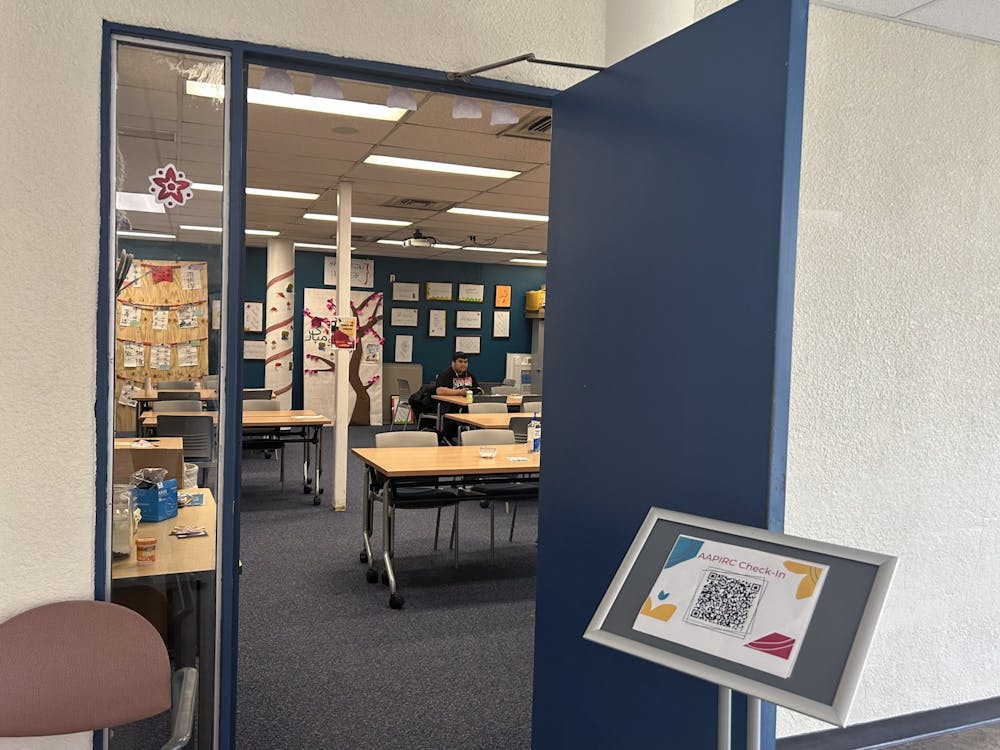The University of New Mexico has several resource centers on campus to support new and current students, one of which is the Asian American Pacific Islander Resource Center.
Farah Nousheen, the Student Success Specialist at AAPIRC, recently gave a speech at the center’s second annual convocation with the message, “The next Buddha will be a sangha.” Sangha means “community” in Sanskrit.
“That's really the main takeaway for me from this year (at the center), that we must do this in community,” Nousheen said.
The center — located on the second floor of the Education Building — provides AAPI students with a physical space on campus to form community along with support for both mental health and academics. The center was created in 2020 due to a stark absence of resource centers for AAPI students on campus, Nousheen said.
“It was a student initiative that started during the pandemic because of the anti-Asian rhetoric … including very violent crimes that were happening, and the students knew that they needed support from our university,” Nousheen said at the convocation.
Since then, the center has worked to create a sense of community and belonging on campus for AAPI students, Nousheen said. After stepping into the director role this past year, AAPIRC has started new programs for students, including language appreciation circles.
The appreciation circles include three languages that are not taught at UNM: Tagalog, Vietnamese and Urdu/Hindi. The circles led by students Vincent Hilario, Huy Nguyen, Aiman Aamer and Ashish Joshi are intended to be a place to connect with languages that are often lost due to assimilation.
“Loss of language happens through assimilation for second generation, third generation Asian Americans. Due to various societal dynamics, this immigrant population experiences an involuntary loss of heritage language. This brings pain and identity issues of all kinds,” Nousheen said at the convocation.
The circles are open to all students at AAPIRC, and the center's student ambassador, Bethany Brundage, said that the amount of people interested in the language appreciation circles has been impactful to her.
“It's really cool to see how our students who come to the resource center everyday come along to a language session and learn a new language, even though that's not their mother tongue, but they just want to support and just learn,“ Brundage said.
Brundage, an out-of-state student, entered the university right as the center was formed. She said that before she came to UNM, she was shocked an AAPIRC hadn’t existed and made a commitment to either start one or become involved.
“I didn't know any family (or) friends when I came here. I only had a dorm to stay in. When I had this opportunity to work at a resource center that represents who I am, I was like, ‘Oh my gosh, I can do what I love and have a space where I feel belonging,’” Brundage said.
Get content from The Daily Lobo delivered to your inbox
The sense of community formed at the center, Brundage said, is built through student organization-led activities and the center's celebrations, which include Lunar New Year, Persian New Year and Nawroz, as well as monthly Mahjong tournaments.
“(The center creates) more of a belonging, getting to meet people who look like me, or share the same culture or the same mindset (of) having a space just for us. Just showcasing who we are — what we can do as a group,” Brundage said.
Another priority for the center is academic support for students. As a former academic advisor, Nousheen said she aims to provide educational support for students by showing them the options for degree planning and majors, as AAPI students are traditionally forced into Science, Technology, Engineering and Mathematics degrees.
Being forced into STEM, Nousheen said, is an effect of the model minority myth — a stereotype that frames AAPI folks as a monolithic and high-achieving group, failing to account for their diverse lived experiences, according to NPR. This can take a large toll on students mental health, Nousheen said.
“Either way, people are impacted by the model minority myth. Either you're working really hard to keep up with that model minority and trying to be the best you can, or you can't be part of the model minority and you feel really bad. Either way, you're impacted, so that affects the body in different ways,” Nousheen said.
As a way to support students and practice self-care, Nousheen — who’s also the founder of Yoga for People of Color — started weekly yoga sessions at the center. Yoga is something that has been appropriated and commodified by Western society, but is integral to healing for the AAPI community, Nousheen said.
“For us to work through our trauma of immigration, we have to be moving, we have to be meditating and we have to have culturally appropriate practices in order to heal,” Nousheen said.
With the history of the center being rooted in student advocacy, Brundage said that student leadership and community is integral.
“That's why this resource center came to be. So just knowing that, you do have a voice. You can do whatever you want if you just take action,” Brundage said.
Maddie Pukite is the editor-in-chief at the Daily Lobo. They can be contacted at editorinchief@dailylobo.com on Twitter @maddogpukite






